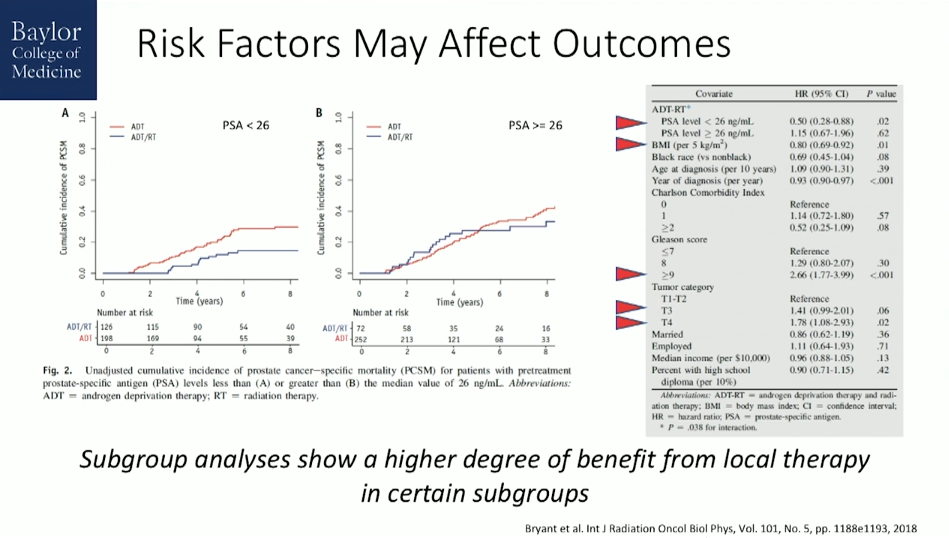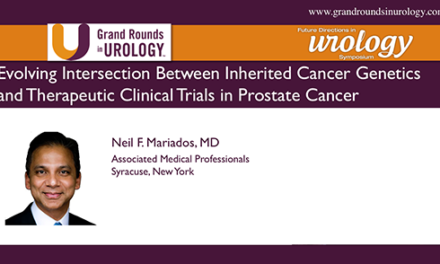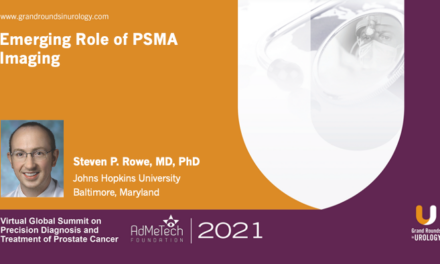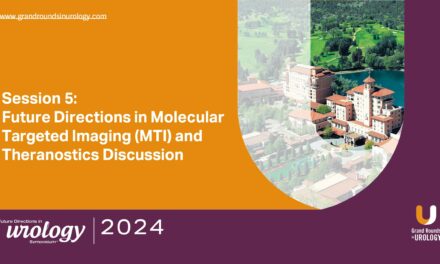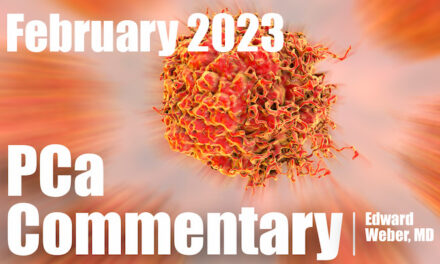A. Edward Yen, MD, presented “Regionally Advanced Prostate Cancer” during the 24th Annual Innovations in Urologic Practice on September 13, 2019 in Santa Fe, New Mexico.
How to cite: Yen, A. Edward. “Regionally Advanced Prostate Cancer” September 13, 2019. Accessed Aug 2025. https://grandroundsinurology.com/regionally-advanced-prostate-cancer/
Regionally Advanced Prostate Cancer – Summary:
A. Edward Yen, MD, discusses the incidence, prognosis, and therapeutic considerations for regionally advanced prostate cancer. He defines the delineation between clinical and pathologic lymph node metastatic prostate cancers and emphasizes the importance of prescribing therapy based on individual risk factors.
Abstract:
Regionally advanced prostate cancer can be defined as prostate cancer with pelvic lymph node involvement. Generally, lymph node metastatic disease can present either clinically upon imaging scans, denoting cN1, or pathologically at the time of prostatectomy, denoting pN1.
The incidence of cN1 is low, and though it shares the label of stage IV cancer as prostate cancer with distant metastasis (cM1), cN1 has a relatively better prognosis. Systemic therapy is a mainstay of treatment for stage IV cancer, with a focus on disease control rather than cure. For example, abiraterone is associated with an overall and failure-free survival benefit in node-positive patients. However, there has recently been some debate regarding the potential role of local therapy for cN1.
Numerous studies have suggested possible benefits from local therapy for cN1 disease. For example, retrospective population-based studies (Rusthoven et al. and Tward et al.) show a long-term overall survival benefit and a long-term prostate-cancer-specific survival benefit with radiation therapy versus no radiation therapy in patients with cN1 disease.
Subgroup analyses show a higher degree of benefit from local therapy in certain subgroups. For instance, patients with lower baseline PSA levels might have a higher benefit than those with high baseline PSA. Body mass index might also have an effect. Other risk factors contributing to outcome include Gleason score and tumor category.
Compared to cN1, pN1 has a relatively poor prognosis. Randomized trials support immediate androgen deprivation therapy (ADT) over deferred ADT and observation, and systemic therapies have been investigated. As with cN1 disease, local therapy does appear capable of playing a potentially beneficial role in the treatment of pN1 disease. Radiation therapy and radical prostatectomy are both associated with survival benefit in retrospective studies. Notably, the Abdollah trial, which evaluated the impact of radiation therapy on survival, showed a delineation of results dependant on certain patient subgroups. This reinforces the importance of considering individual risk factors when determining treatment for regionally advanced prostate cancer.
About the 24th Annual Innovations in Urologic Practice
Innovations in Urologic Practice (Innovations) is an annual, multi-day, CME-accredited conference devoted to innovative diagnostic and treatment strategies for and controversies related to some of the most common urologic problems in the current era. The topics covered include oncological management of the bladder, kidney, and prostate. The conference also emphasizes general urology topics in pelvic reconstruction and trauma, men’s health, and infections in the urology patient. Dr. Yen presented this lecture during the 24th Innovations in 2019. Please visit this page in order to register for future Innovations meetings.
ABOUT THE AUTHOR
A. Edward Yen, MD, is an assistant professor of medicine in the hematology and oncology section at Baylor College of Medicine in Houston, Texas. He is a practicing genitourinary medical oncologist at the Dan L Duncan Comprehensive Cancer Center and the Bladder Cancer Center at Baylor He is also affiliated with Baylor St. Luke’s Medical Center and the Houston VA Medical Center Hospital. Dr. Yen earned his MD from Baylor College of Medicine. His research on androgen receptors in hormone-dependent and castration-resistant prostate cancer has been published in Pharmacology & Therapeutics. His professional interests include prostate and genitourinary cancers.

